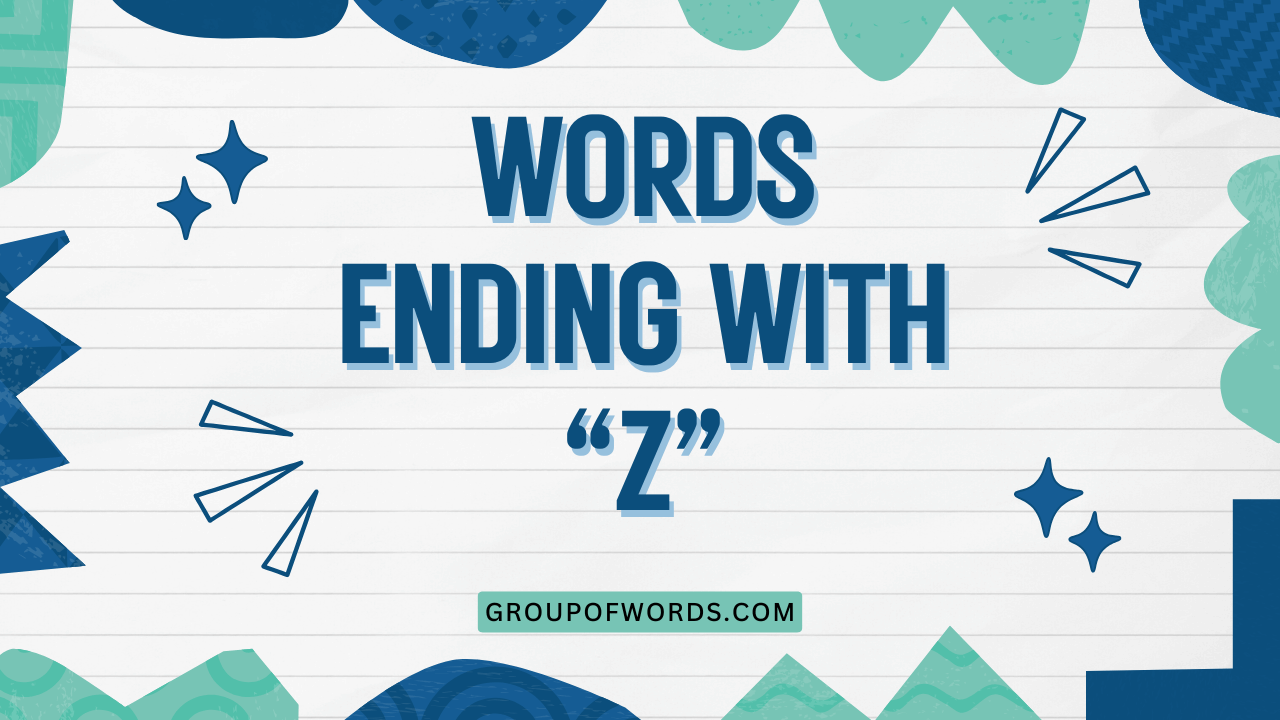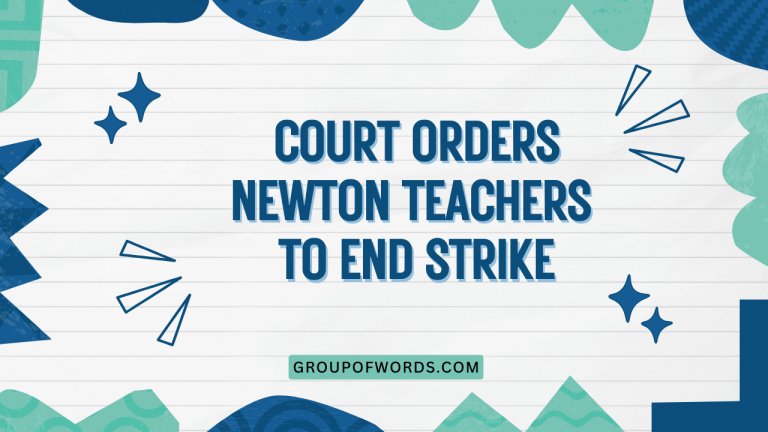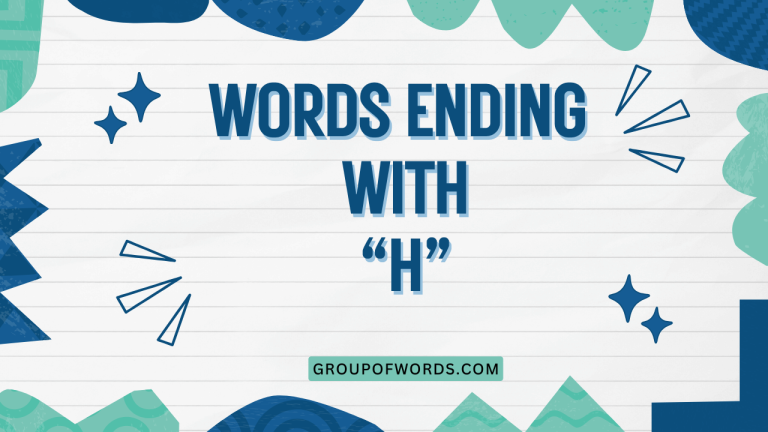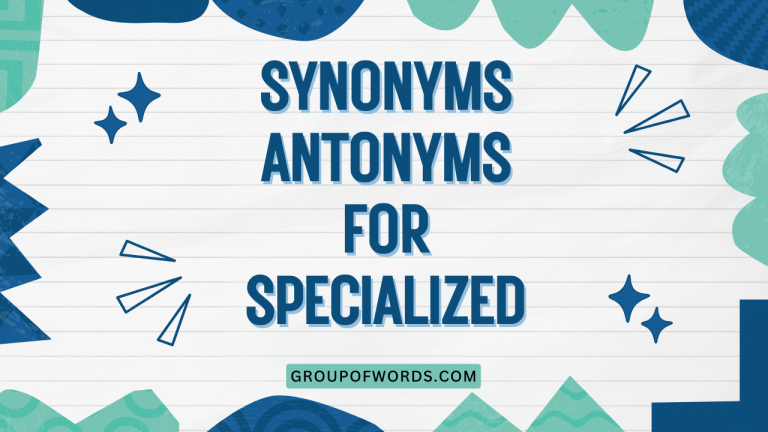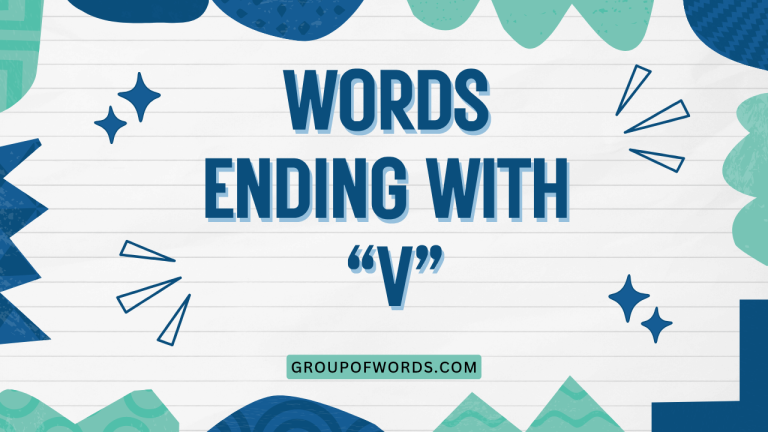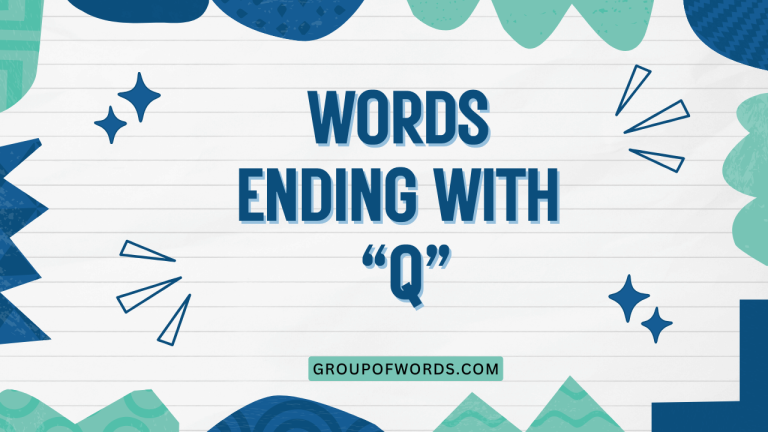Words Ending in Z: A Comprehensive Grammar Guide
Understanding words that end in “z” is crucial for mastering English vocabulary and spelling. While relatively few words end with this letter, they often carry unique meanings and grammatical functions.
This guide provides a detailed exploration of words ending in “z,” covering their definitions, usage, common mistakes, and more. Whether you’re an English language learner or a seasoned writer, this article will enhance your understanding and usage of these words.
Table of Contents
- Introduction
- Definition of Words Ending in Z
- Structural Breakdown
- Types and Categories of Words Ending in Z
- Examples of Words Ending in Z
- Usage Rules for Words Ending in Z
- Common Mistakes with Words Ending in Z
- Practice Exercises
- Advanced Topics
- FAQ
- Conclusion
Introduction
Words ending in the letter “z” are a small but significant part of the English lexicon. They often add a distinct flavor to our language, whether through their unusual sounds or specific meanings.
Mastering these words can greatly improve your vocabulary and your ability to communicate effectively. This guide is designed to provide a comprehensive overview of words ending in “z,” including their grammatical functions, common usages, and potential pitfalls.
This article is beneficial for English language learners, students, writers, and anyone interested in expanding their knowledge of English grammar and vocabulary. By understanding the nuances of words ending in “z,” you can enhance your writing, speaking, and overall comprehension of the English language.
This resource offers detailed explanations, examples, and practice exercises to solidify your understanding and improve your confidence in using these words correctly.
Definition of Words Ending in Z
Words ending in “z” can belong to various parts of speech, including nouns, verbs, adjectives, and interjections. The letter “z” often indicates a buzzing or vibrating sound, which can sometimes be reflected in the meaning of the word.
Understanding the grammatical function of these words is essential for using them correctly in sentences.
In general, words ending in “z” follow the standard rules of English grammar for their respective parts of speech. For example, nouns ending in “z” can be singular or plural, and verbs ending in “z” can be conjugated in different tenses.
The specific meaning and usage of each word depend on its context within a sentence.
Structural Breakdown
The structure of words ending in “z” typically involves a root word followed by the letter “z.” In some cases, the “z” is part of a suffix, such as “-ize” or “-ization,” which are commonly used to form verbs and nouns, respectively. The presence of the “z” can also influence the pronunciation and spelling of related words.
Many verbs ending in “z” are formed by adding the suffix “-ize” to a noun or adjective. This suffix indicates the act of making or becoming something.
For example, the verb “harmonize” is formed from the noun “harmony,” and it means to make harmonious. Similarly, “normalize” is derived from “normal,” meaning to make normal.
Nouns ending in “z” can be singular or plural, and their plural forms usually follow the standard rules of adding “-s” or “-es.” However, some nouns ending in “z” may have irregular plural forms. Understanding these structural patterns can help you to better understand and use words ending in “z” correctly.
Types and Categories of Words Ending in Z
Words ending in “z” can be categorized based on their part of speech. The most common categories are nouns, verbs, adjectives, and interjections.
Each category has its own specific rules and usage patterns.
Nouns
Nouns ending in “z” refer to people, places, things, or ideas. They can be singular or plural, concrete or abstract.
Examples include “blitz,” “quartz,” and “waltz.” The plural form of these nouns usually follows the standard rule of adding “-es” or “-s,” but there can be exceptions.
Verbs
Verbs ending in “z” typically describe actions or states of being. Many of these verbs are formed by adding the suffix “-ize” to a noun or adjective.
Examples include “analyze,” “fertilize,” and “organize.” These verbs can be conjugated in different tenses to indicate when the action occurred.
Adjectives
Adjectives ending in “z” describe or modify nouns. These adjectives are less common than nouns and verbs ending in “z.” Examples include “schmaltzy” and words borrowed from other languages.
Adjectives ending in “z” add a unique descriptive quality to the nouns they modify.
Interjections
Interjections ending in “z” are words or phrases used to express sudden emotions or reactions. These are relatively rare.
An example might be a sound effect represented in writing, though this is less formal.
Examples of Words Ending in Z
To illustrate the usage of words ending in “z,” here are several examples organized by category. These examples demonstrate how these words can be used in different contexts and grammatical structures.
Nouns Examples
Here are some examples of nouns ending in “z,” along with their definitions and example sentences. This table provides a clear understanding of how these nouns are used in context.
| Noun | Definition | Example Sentence |
|---|---|---|
| Blitz | A sudden, energetic, and concerted effort, typically on a specific task. | The company launched a marketing blitz to promote their new product. |
| Quartz | A hard, crystalline mineral composed of silicon and oxygen atoms. | The countertop was made of beautiful quartz. |
| Waltz | A dance in triple meter performed by a couple who as a pair turn rhythmically around and around. | They performed a graceful waltz at the wedding. |
| Fez | A felt hat in the shape of a truncated cone, usually red with a black tassel. | He wore a traditional fez during the cultural festival. |
| Gadzooks | An archaic or humorous exclamation of surprise or annoyance. | “Gadzooks!” he exclaimed when he realized he’d forgotten his keys. |
| Schmooz | Talk intimately and coaxingly; gossip. | He went to the conference to schmooz with potential clients. |
| Buzz | A low, continuous humming or murmuring sound, like that made by bees. | The buzz of the refrigerator was keeping me awake. |
| Frizz | Hair that is tightly curled or not smooth. | The humidity caused her hair to frizz. |
| Whiz | A person who is extremely clever at something. | He is a computer whiz. |
| Quiz | A test of knowledge, especially a brief informal one. | The teacher gave a short quiz on the chapter. |
| Jazz | A type of music of black American origin characterized by improvisation, syncopation, and usually a regular or forceful rhythm. | They listened to jazz at the club. |
| Pizazz | An attractive combination of vitality and glamour. | She added some pizazz to the presentation. |
| Craze | An enthusiasm for a particular activity or object that appears suddenly and achieves widespread but short-lived popularity. | The new toy became a national craze. |
| Gaze | A long, steady look. | She met his gaze across the room. |
| Haze | A slight obscuration of the lower atmosphere, typically caused by fine suspended particles. | A haze hung over the city. |
| Glitz | Extravagant but superficial display. | The event was full of glitz and glamour. |
| Klutz | A clumsy person. | He is such a klutz; he always trips. |
| Matzoh/Matzah | Unleavened bread eaten by Jews during Passover. | They ate matzah during the Passover Seder. |
| Spitz | A breed of dog with long thick hair, a tail that curls over its back, and pointed ears and muzzle. | She owned a fluffy white spitz. |
| Tzatziki | A sauce, dip, or soup made of yogurt, cucumber, garlic, salt, olive oil, sometimes with vinegar or lemon juice, and dill, mint, or parsley. | We ordered tzatziki as an appetizer. |
| Tzar/Czar | An emperor or king. | The czar ruled Russia with an iron fist. |
| Kibbutz | A collective community in Israel that was traditionally based on agriculture. | They lived on a kibbutz in the Galilee. |
| Snitz | Pieces of dried apple. | She baked a pie with snitz. |
Verbs Examples
Here are some examples of verbs ending in “z,” along with their definitions and example sentences. Note how many utilize the “-ize” suffix.
| Verb | Definition | Example Sentence |
|---|---|---|
| Analyze | Examine methodically and in detail the constitution or structure of (something, especially information), typically for purposes of explanation and interpretation. | The scientist will analyze the data to draw conclusions. |
| Fertilize | Introduce semen into (a female animal or plant). | The farmer will fertilize the soil to improve crop yields. |
| Organize | Arrange into a structured whole; order. | She will organize her closet this weekend. |
| Realize | Become fully aware of (something) as a fact; understand clearly. | I didn’t realize how late it was. |
| Utilize | Make practical and effective use of. | We need to utilize our resources more efficiently. |
| Authorize | Give official permission for or approval to (something). | The manager must authorize the purchase. |
| Finalize | Complete or conclude (something). | We need to finalize the contract by Friday. |
| Prioritize | Designate or treat (something) as more important than other things. | You should prioritize your tasks to meet the deadline. |
| Customize | Modify (something) to suit a particular individual or task. | You can customize the software to fit your needs. |
| Harmonize | Add notes to (a melody) to produce harmony. | The singers will harmonize on the chorus. |
| Idealize | Regard or represent as perfect or better than in reality. | People often idealize their childhood memories. |
| Memorize | Commit to memory; learn by heart. | The students must memorize the poem. |
| Normalize | Bring or return to a normal condition or state. | The doctor will normalize the patient’s blood pressure. |
| Scrutinize | Examine or inspect closely and critically. | The accountant will scrutinize the financial records. |
| Summarize | Give a brief statement of the main points of (something). | Please summarize the article in one paragraph. |
| Sympathize | Feel or express sympathy or compassion. | I sympathize with your situation. |
| Trivialize | Make (something) seem less important, significant, or complex than it really is. | Don’t trivialize the issue; it’s very serious. |
| Brutalize | Treat (someone) with extreme violence and cruelty. | The prisoners were brutalized by the guards. |
| Capsize | (of a boat) overturn in the water either by accident or on purpose. | The boat capsized during the storm. |
| Emphasize | Give special importance or prominence to (something) in speaking or writing. | The teacher will emphasize the importance of grammar. |
| Hypnotize | Produce a state of hypnosis in (someone). | The magician tried to hypnotize the audience. |
| Mobilize | (of a country or its government) prepare and organize (troops) for active service. | The army began to mobilize its forces. |
| Patronize | Treat with an apparent kindness that betrays a feeling of superiority. | Don’t patronize me; I know what I’m doing. |
Adjectives Examples
Here are some less common examples of adjectives ending in “z,” along with their definitions and example sentences.
| Adjective | Definition | Example Sentence |
|---|---|---|
| Schmaltzy | Excessively sentimental, maudlin, or gushing. | The movie was too schmaltzy for my taste. |
| Fuzzy | Difficult to perceive clearly or understand and explain precisely; indistinct or vague. | The photograph was fuzzy and out of focus. |
| Dizzy | Having or involving a sensation of spinning around and losing one’s balance. | The height made me feel dizzy. |
| Breezy | Characterized by fresh air or a cheerful, casual manner. | It was a breezy day at the beach. |
Interjections Examples
Interjections ending in “z” are rare, but they can be used to express strong emotions or sounds. In many cases, these are onomatopoeic.
| Interjection | Definition | Example Sentence |
|---|---|---|
| Zzz | Represents the sound of snoring. | Zzz, he was fast asleep. |
| Whizz | Used to describe the sound of something moving quickly through the air. | Whizz, the ball flew past my head! |
Usage Rules for Words Ending in Z
The usage rules for words ending in “z” are generally consistent with the rules for their respective parts of speech. Nouns must agree in number with their verbs, and verbs must be conjugated correctly to indicate tense.
Adjectives must agree in number and gender with the nouns they modify, where applicable.
One important rule to remember is the spelling of plural nouns ending in “z.” Most nouns ending in “z” form their plural by adding “-es,” such as “quizzes.” However, some nouns may have irregular plural forms, so it’s important to consult a dictionary when in doubt.
When using verbs ending in “-ize,” it’s important to be aware of the differences between American and British English. In American English, the “-ize” suffix is standard, while in British English, the “-ise” suffix is often preferred.
For example, “organize” is the standard American spelling, while “organise” is common in British English. Both spellings are generally accepted, but it’s important to be consistent within a single piece of writing.
Common Mistakes with Words Ending in Z
One common mistake is misspelling words ending in “z,” particularly when forming plurals or conjugating verbs. For example, writing “quizs” instead of “quizzes” is a common error.
Another mistake is using the wrong form of a verb ending in “-ize” or “-ise” depending on the context (American vs. British English).
Another common mistake involves using words ending in “z” inappropriately in formal writing. Some words ending in “z,” such as “schmaltzy,” may be considered informal or colloquial, and they may not be suitable for all contexts.
It’s important to consider the tone and audience of your writing when choosing words ending in “z.” The table below shows some common mistakes and corrections:
| Incorrect | Correct | Explanation |
|---|---|---|
| quizs | quizzes | Most nouns ending in ‘z’ form their plural by adding ‘-zes’. |
| organise (American English) | organize (American English) | ‘-ize’ is the standard suffix in American English. |
| organize (British English) | organise (British English) | ‘-ise’ is a common suffix in British English. |
| I am sympathize with you. | I sympathize with you. | “Sympathize” is a verb and doesn’t need an auxiliary verb in simple present tense. |
Practice Exercises
Test your knowledge of words ending in “z” with these practice exercises. Each exercise focuses on different aspects of grammar and vocabulary related to these words.
Exercise 1: Fill in the blanks with the correct form of the word in parentheses.
| Question | Answer |
|---|---|
| The company decided to ______ its operations. (modernize) | modernize |
| The students had to take a weekly ______. (quiz) | quiz |
| The artist added some ______ to the painting. (pizazz) | pizazz |
| The doctor will ______ the patient’s condition. (analyze) | analyze |
| The team launched a marketing ______. (blitz) | blitz |
| I ______ with your situation. (sympathize) | sympathize |
| They will ______ the soil before planting. (fertilize) | fertilize |
| She tried not to ______ the importance of the issue. (trivialize) | trivialize |
| He is a computer ______. (whiz) | whiz |
| The government will ______ the new regulations. (authorize) | authorize |
Exercise 2: Correct the errors in the following sentences.
| Question | Answer |
|---|---|
| The teacher gave us two quizs this week. | The teacher gave us two quizzes this week. |
| I want to utilise my skills to help others. (American English) | I want to utilize my skills to help others. |
| She is organiseing her closet. | She is organizing her closet. |
| He felt dizzye after the ride. | He felt dizzy after the ride. |
| The movie was so schmaltsy. | The movie was so schmaltzy. |
| The boat capsize during the storm. | The boat capsized during the storm. |
| She had to memorize the poem. | She had to memorize the poem. |
| They will scrutinize the documents carefully. | They will scrutinize the documents carefully. |
| The general mobilize the troops. | The general mobilized the troops. |
| He felt a strong buzz from the coffee. | He felt a strong buzz from the coffee. |
Exercise 3: Choose the correct word to complete each sentence.
| Question | Answer |
|---|---|
| The artist added some (pizazz/pizaz) to the performance. | pizazz |
| The geologist studied the (quartz/quarts) formation. | quartz |
| The company decided to (modernize/modernise) its facilities. (American English) | modernize |
| The company decided to (modernize/modernise) its facilities. (British English) | modernise |
| The (blitz/blitts) of advertising helped increase sales. | blitz |
| The detective had to (analyze/analyse) the clues. (American English) | analyze |
| The detective had to (analyze/analyse) the clues. (British English) | analyse |
| The old film had a (fuzzy/fuzzi) quality to it. | fuzzy |
| She tried to (idealize/idealise) her past. (American English) | idealize |
| She tried to (idealize/idealise) her past. (British English) | idealise |
Advanced Topics
For advanced learners, understanding the etymology and historical usage of words ending in “z” can provide deeper insights into their meanings and nuances. Many words ending in “z” have origins in other languages, such as German, Hebrew, and Yiddish.
Exploring these origins can help you to appreciate the rich history and diversity of the English language.
Another advanced topic is the use of words ending in “z” in figurative language, such as metaphors and similes. These words can add vividness and expressiveness to your writing, but it’s important to use them appropriately and avoid clichés.
For example, the phrase “a whirlwind of activity” uses the word “whirlwind” to create a powerful image of rapid and chaotic movement.
Finally, advanced learners can explore the use of words ending in “z” in specialized fields, such as science, technology, and medicine. Many technical terms ending in “z” have precise and specific meanings, and understanding these meanings is essential for effective communication in these fields.
FAQ
Here are some frequently asked questions about words ending in “z,” along with detailed answers.
Q1: Are there many words in English that end with the letter “z”?
A: No, relatively few words in English end with the letter “z” compared to other letters. However, the words that do end in “z” are often distinctive and important to know.
Q2: What is the most common suffix that includes the letter “z”?
A: The most common suffix is “-ize” (or “-ise” in British English), which is used to form verbs from nouns or adjectives. This suffix indicates the act of making or becoming something.
Q3: How do I form the plural of nouns ending in “z”?
A: Most nouns ending in “z” form their plural by adding “-zes” to the end of the word. For example, the plural of “quiz” is “quizzes.” However, some nouns may have irregular plural forms, so it’s always a good idea to consult a dictionary when in doubt.
Q4: What is the difference between “-ize” and “-ise” suffixes?
A: The “-ize” suffix is standard in American English, while the “-ise” suffix is common in British English. Both spellings are generally accepted, but it’s important to be consistent within a single piece of writing.
Q5: Are there any adjectives that commonly end in “z”?
A: Adjectives ending in “z” are less common than nouns and verbs. Examples include “schmaltzy” and “fuzzy.” These adjectives often add a unique descriptive quality to the nouns they modify.
Q6: Why do some words ending in “z” sound unusual?
A: The letter “z” often indicates a buzzing or vibrating sound, which can sometimes make words ending in “z” sound unique. Additionally, many words ending in “z” have origins in other languages, which can contribute to their unusual sounds.
Q7: Is it acceptable to use slang words ending in “z” in formal writing?
A: It depends on the context and audience of your writing. Some words ending in “z,” such as “schmaltzy,” may be considered informal or colloquial, and they may not be suitable for all contexts.
It’s important to consider the tone and purpose of your writing when choosing words ending in “z.”
Q8: How can I improve my vocabulary of words ending in “z”?
A: One way to improve your vocabulary is to read widely and pay attention to the words that end in “z.” You can also consult dictionaries and thesauruses to learn new words and their meanings. Additionally, practicing using these words in your own writing and speaking can help you to solidify your understanding and improve your fluency.
Conclusion
Understanding words ending in “z” is a valuable skill for anyone looking to improve their English language proficiency. While these words may be relatively few in number, they often carry unique meanings and grammatical functions.
By mastering the rules and patterns associated with these words, you can enhance your vocabulary, improve your writing, and communicate more effectively.
Remember to pay attention to the spelling of plural nouns ending in “z,” and be aware of the differences between American and British English when using verbs ending in “-ize” or “-ise.” Practice using these words in different contexts, and don’t be afraid to consult a dictionary or thesaurus when in doubt. With consistent effort and attention to detail, you can confidently and accurately use words ending in “z” in your everyday communication.
